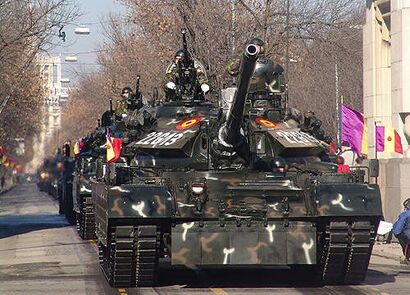December Revolution
This article is incomplete because it is pending further input from participants, or it is a work-in-progress by one author. Please comment on this article's talk page to share your input, comments and questions. Note: To contribute to this article, you may need to seek help from the author(s) of this page. |
| December Revolution | |||
|---|---|---|---|
 Tanks of the 2e. Tank Division entering Brigançon. | |||
| Date | 17 December, 2021 | ||
| Location | |||
| Resulted in | National Congress dissolved Elections suspended Revolutionary Defence Committee assumes emergency powers Merçe Cruèselles elected interim-Premier of Champania | ||
| Parties to the civil conflict | |||
| |||
| Lead figures | |||
| Casualties | |||
| Death(s) | 69 | ||
| Injuries | 405 | ||
| Arrested | 381 | ||
The December Revolution (Liguersien: La revoluçon de deceme; Gaullican: La révolution de Décembre), also known as the 2021 Champanois coup d'etat in foreign media, refers to the seizure of the government by Hardliner factions in the Champanois government with the assistance of the Champanois People's Army and other paramilitary forces that took place on 17 December, 2021. During the coup, hardliner politicians in the Champanois Socialist Workers' Party and Action for Socialist Unity seized control of the government through the Revolutionary Defence Committee. It marks the fourth major coup experienced by Champania since its independence, the others being in 1937, 1956, and 1969.
The coup was motivated by on-going political and civil unrest enveloping the nation. On 23 November, acting Premier Ponç Guinovaerd announced talks were being initiated with other MASSOR member-states over the opening of foreign military installations within Champania, subsequently leading to the collapse of the Guinovaerd government the following day. Protests emerged in all major cities, with clashes with police becoming common by 30 November. The inability for the National Congress to form a new caretaker government prompted hardliners within the country's two largest political parties to take action.
The coup was originally planned to coincide with 2022 Champanois general election taking place on 15 February, and was planned to be based on electoral fraud. Continued civil unrest, including fears of foreign agents and capitalist elements further inciting the protests, prompted the coup to be executed before plans could be finalized. In the early hours of 17 December, Lt Gen Abril Romieu led the 2e. Tank Division into Brigançon and, together with Red Guards and forces of the State Protection Authority, seized control of the capital. The arrival of the coup was met with popular support, although by the evening, anti-coup demonstrations and clashes with coup forces had erupted in the city, resulting in the deaths of 50 civilians, with hundreds more injured and arrested. The coup was completed the next day on 18 December when a state of emergency was declared and the Revolutionary Defence Committee took over as the supreme executive and legislative body for the country.